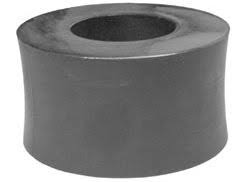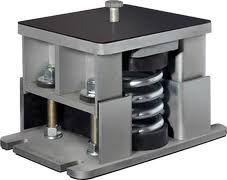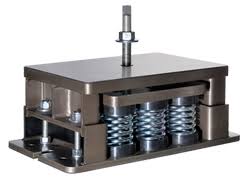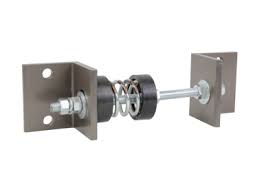Rubber vibration isolators spring floor mount vibration isolator are essential components in maximizing equipment efficiency across various industries. These isolators are designed to minimize the transmission of vibration and noise from machinery, thereby extending the lifespan of equipment and reducing maintenance costs. By effectively isolating the vibrating equipment from its surroundings, rubber vibration isolators play a crucial role in preventing damage and ensuring smooth operation. In this article, we will explore the benefits of using rubber vibration isolators and how they can contribute to maximizing equipment efficiency.
Maximizing equipment efficiency with rubber vibration isolators involves using specialized rubber mounts or pads to reduce the transmission of vibration from machinery to the surrounding environment. This helps to minimize noise, protect nearby equipment from damage, and improve the overall performance of the vibration isolation mount machinery. Rubber vibration isolators are commonly used in industrial and commercial settings, such as in HVAC systems, industrial equipment, and heavy machinery. By mitigating the effects of vibration, these isolators help to extend the lifespan of equipment and reduce maintenance needs, ultimately maximizing efficiency and productivity.
Maximizing equipment efficiency with rubber vibration isolators involves utilizing specialized rubber mounts to reduce vibrations transmitted from machinery to the surrounding environment. This minimizes noise, protects nearby equipment from damage, and enhances floor vibration isolator overall machinery performance. Rubber vibration isolators are commonly applied in industrial and commercial settings such as HVAC systems, industrial equipment, and heavy machinery. By dampening vibration effects, these isolators help extend equipment lifespan while reducing maintenance needs, ultimately maximizing efficiency and productivity.
The Importance of Rubber Vibration Isolators in Industrial Machinery
vibration isolators hvac

Rubber vibration isolators are an essential component of industrial machinery as they help to reduce the transmission of vibration and noise from the machinery to its surroundings. This is important for ensuring the smooth operation of the machinery and for creating a safe and comfortable working environment for the operators. Vibration isolators also help to protect the machinery itself from the damaging effects of excessive vibration, which can lead to premature wear and failure of critical components. By effectively isolating the machinery from its surroundings, rubber vibration isolators can also help to minimize maintenance costs and extend the lifespan of industrial equipment. Overall, the use of rubber vibration isolators is crucial for improving the performance, reliability, and safety of industrial machinery.
Choosing the Right Rubber Vibration Isolators for Your Equipment

When choosing the right rubber vibration isolators for your equipment, it is important to consider several factors. These include the weight of the equipment, the frequency and amplitude of the vibrations it produces, and the specific environment in which it will be used. Additionally, consider the level of isolation required to protect both the equipment and its surroundings from excessive vibration. It is also important to take into account any industry standards or regulations that may apply to the use of vibration isolators in your specific application. Lastly, consider the potential for future upgrades or changes to the equipment, and choose isolators that can accommodate any potential modifications. By carefully considering these factors, you can select rubber vibration isolators that will effectively minimize vibration and protect your equipment and its surroundings.
How Rubber Vibration Isolators Improve Ride Quality in Vehicles

Rubber vibration isolators are used in vehicles to reduce the impact of vibrations on the ride quality. These components are designed to absorb and minimize the transmission of vibrations from the road surface, engine, and other sources, allowing for a smoother and more comfortable driving experience. By isolating the vehicle's body and suspension system from these vibrations, rubber isolators help to reduce noise, harshness, and overall wear and tear on the vehicle. This ultimately leads to improved comfort for passengers and less stress on the vehicle's components, resulting in a better overall ride quality.
The Role of Rubber Vibration Isolators in HVAC Systems

Rubber vibration isolators play a crucial role in HVAC systems by minimizing the transmission of noise and vibration from the equipment to the surrounding structures. These isolators are used to support and secure different HVAC components such as air handlers, compressors, and fans, and help in maintaining a quiet and comfortable environment within a building. By absorbing and dissipating the vibrations generated by the HVAC equipment, rubber isolators help in preventing structural damage and minimizing the transfer of noise to the occupied spaces. They also aid in extending the lifespan of the HVAC equipment by reducing the wear and tear caused by excessive vibration. Overall, the use of rubber vibration isolators in HVAC systems is essential for ensuring optimal performance, energy efficiency, and occupant comfort.
Advantages of Using Rubber Vibration Isolators in Aerospace Applications
Rubber vibration isolators offer several advantages for aerospace applications. Firstly, they provide effective vibration and shock isolation, protecting sensitive equipment and components from the potentially damaging effects of excessive vibration. This is critical for ensuring the safety and performance of aircraft and spacecraft. Additionally, rubber isolators are lightweight and can be designed to meet specific performance requirements, making them a versatile solution for a wide range of aerospace applications. Furthermore, rubber isolators are durable and can withstand demanding operating conditions, including extreme temperatures and exposure to various fluids. This makes them well-suited for use in aerospace environments where reliability and longevity are essential. Overall, the use of rubber vibration isolators in aerospace applications can contribute to improved performance, safety, and operational efficiency.
Common Types of Rubber Vibration Isolators and Their Uses
There are several common types of rubber vibration isolators, including cylindrical mounts, sandwich mounts, and bushings. Cylindrical mounts are often used in engine mounts and other heavy-duty applications, while sandwich mounts are commonly used in equipment that requires both vibration isolation and shock absorption. Bushings are used to isolate vibrations in machinery and automotive applications. These types of rubber isolators are used in a variety of industries, including automotive, aerospace, industrial, and HVAC. They help to reduce the transmission of vibrations from machinery and equipment, which can lead to improved performance, reduced noise levels, and increased equipment longevity. Rubber vibration isolators are also used in a wide range of applications, including engines, generators, pumps, compressors, and HVAC systems. They are designed to provide effective vibration isolation while withstanding the demands of specific applications and environments. Overall, rubber vibration isolators play a crucial role in reducing the impact of vibrations on equipment and machinery, leading to improved performance and longevity.
How to Maintain and Extend the Lifespan of Rubber Vibration Isolators
To maintain and extend the lifespan of rubber vibration isolators, it is important to regularly inspect them for wear and tear, damage, or deformation. Replace any isolators that show signs of damage. Keep the isolators clean and free from debris and corrosive materials. Minimize exposure to extreme temperatures, UV radiation, and chemicals. When installing isolators, ensure they are properly and securely mounted according to the manufacturer's guidelines. Regularly check and retighten mounting bolts as needed. Additionally, consider using protective coverings or shields to further protect the isolators from environmental factors.
The Environmental Impact of Rubber Vibration Isolators in Construction Projects
Rubber vibration isolators in construction projects have a significant environmental impact. The production of rubber isolators involves the use of resources such as rubber and other materials, as well as energy for manufacturing processes. Additionally, the transportation of these isolators to construction sites contributes to carbon emissions and air pollution. Furthermore, once the rubber isolators are installed in buildings or infrastructure, they may release harmful chemicals and pollutants into the environment over time, especially when they degrade or are disposed of improperly. This can lead to soil and water contamination, affecting local ecosystems and potentially posing health risks to nearby communities. In terms of construction operations, the use of rubber isolators can also contribute to noise pollution, as they are often employed to reduce vibrations and noise from heavy machinery and equipment. Excessive noise can disrupt wildlife habitats, impact human health, and degrade overall environmental quality. Overall, the environmental impact of rubber vibration isolators in construction projects underscores the importance of considering sustainable alternatives and implementing proper disposal and maintenance practices to minimize their negative effects on the environment.
In conclusion, rubber vibration isolators play a crucial role in maximizing equipment efficiency. By effectively reducing the transmission of vibration and noise, these isolators help extend the lifespan of equipment and improve overall performance. Investing in high-quality rubber vibration isolators can lead to cost savings and increased productivity in various industrial and commercial applications. It is clear that utilizing rubber vibration isolators is a smart choice for achieving optimal equipment efficiency and performance.
See also
https://www.vmcgroup.com/vibration-control https://www.easyflex.in/vibration-isolation-products.html https://www.pcb.com/vibration-isolation